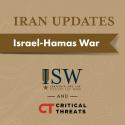Iran Update, May 4, 2024
May 4, 2024 - ISW Press
Hamas and Qatari delegations arrived in Cairo to discuss the current ceasefire proposal on May 4. Hamas is expected to present an official response to the proposal during the discussions.[2] Arab mediators told the Wall Street Journal that the head of Hamas in the Gaza Strip, Yahya Sinwar, said on May 3 that the proposed deal is the closest deal to Hamas’ demands so far, but Sinwar raised several conditions. Hamas Political Bureau member Ghazi Hamad said that the group is still considering the proposal and considering its response. Senior Hamas official Mahmoud Mardawi told Palestinian media on May 3 that Hamas is skeptical that Israel will implement the ceasefire deal given internal Israeli politics. Israel has not sent a delegation to participate in the talks, but an unnamed Israeli official said that Israel will send a delegation to Cairo if there is “positive movement” on the Hamas side regarding a deal.










